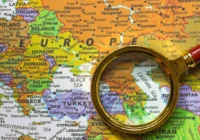Nobody wants to see a nuclear war. But some in the media appear to relish, not war itself, but the prospect of nuclear war. It isn’t as if the media needs something to talk about. There’s plenty of celebrity news to go around, much of it supplied single-handedly by the Kardashians family and Kanye West. Economic chaos, linked in part to the war in Ukraine, has provided some real news, with stories of penury, inflation and the ever-present fear of recession, if not economic collapse. And, of course, there’s a steady stream of sometimes reliable but more commonly unreliable but titillating reporting on war-related events, most often designed to serve Western governments’ hunger for a daily fix of propaganda.
US President Joe Biden has boldly claimed that the war in Ukraine will last “as long as it takes,” clearly meaning that the US will do everything in its power to make it last. For the media, that means months, if not years of sensational war stories as well as continuous coverage of a talented Ukrainian actor in the role of president. But the idea of another forever war stretching out for years to come risks turning off a population weary of being told that growing domestic problems are less important than the sacred duty of fueling a conflict in Eastern Europe.
Fortunately, Vladimir Putin’s sometimes heated rhetoric has allowed Joe Biden to feed the media with some authentic fear by evoking the risk of Armageddon, a term that should certainly resonate with Christan fundamentalists. It also revives for those who are old enough to remember memories of the golden years of the real Cold War, when people were investing in bomb shelters. It was a time when, at any random moment, Americans might be spontaneously visited by the vision of a mushroom-shaped cloud suddenly appearing at the end of the road stretching out before them as they drove back home from work. By the mid-1960s, they could begin wondering whether the hippies hadn’t made the right decision of tuning in, turning on and dropping out. That was truly a period of nuclear optimism. Thanks to the hippies, American consumers felt they still had a choice. Even Stanley Kubrick learned “to stop worrying and love the bomb.”
The hyperreal ocean of electronic media we bathe in today has changed our perception of the very real risks that surround us. No one under the age of 50 today can truly appreciate the deeper anguish that characterized the nuclear age during the original Cold War. A headline in Insider from last Saturday epitomizes the change of atmosphere:“Putin’s nuclear threats are pushing people like Trump and Elon Musk to press for a Ukraine peace deal. A nuclear expert warns that’s ‘dangerous.’”
Yes, peace has become dangerous. The first paragraph makes its case: “An understandable desire to avoid a nuclear war could actually make the world more dangerous if it means rushing to implement a ‘peace’ in Ukraine that serves Russian interests, an expert told Insider.”
Today’s Weekly Devil’s Dictionary definition:
Understandable desire:
A temptation whose attraction appears legitimate while recognizing that no virtuous person should succumb to it
Contextual note
The journal provides the author, Charles R. Davis, with the title, “Senior Reporter at Insider.” Senior clearly means experienced and well-paid. It does not mean over 50. Like many younger journalists, Davis believes his job starts with communicating his (and his journal’s) values to his readers even before reporting the news. He effectively does so by expressing his condescending judgment of weak-minded people who succumb to their “understandable” desires. The value he adheres to is the hallowed American ideal of assertiveness, or in this case, extreme assertiveness. The enemy of assertiveness is humility and a culpable preference for “peace” over war. It is usually referred to as appeasement.
Davis takes the astonishing step of accusing Donald Trump and Elon Musk of failing to be adequately assertive. But that is not all. They have failed in their civic duty for a specific reason: their unreasoned fear of nuclear war. They fail to understand that nuclear war is not something to fear. It is a useful concept real Americans must learn to enthusiastically embrace, not as a desired outcome of their actions, but as the trump card Americans play in the favorite game practiced by the daring minds on Wall Street: Liar’s Poker.
The reasoning of people like Davis – and the same may paradoxically be said of Joe Biden, though he is clearly over 50 – reposes on the belief that nuclear war is too surreal to ever become real. Davis clearly agrees with the man he interviewed, Pavel Podvig, “an expert on Russia’s nuclear doctrine and capabilities at the UN Institute for Disarmament Research.” As is common in today’s journalism, instead of challenging the “expert,” Davis prefers to record uncritically his assertions and denigrate the reasoning of his critics.
Davis begins subtly, by attempting to sound objective when describing what he holds to be the position of Tump, Musk and other Kremlin apologists and spineless appeasers. “Some observers, in good or bad faith,” Davis writes, “have cited the possibility of the unthinkable as all the more reason to negotiate a ceasefire and have at times criticized the US administration they see as leading the world to the precipice of nuclear conflict with its steady stream of aid to Ukraine.”
By inserting “in good or bad faith” in the opening clause, Davis calls into question the sincerity of the critics. More significantly, by focusing on the fear of a nuclear holocaust, he consciously omits another complementary and more substantial argument: that extended wars spreading massive suffering locally and across the globe are in no one’s interest. They merit being resolved rather than prolonged “as long as it takes.”
The recent forever wars in Afghanistan and Iraq should offer convincing evidence of the validity of a futile course of action that has nothing to do with a nuclear threat. But Davis clearly assumes his mission of using the nuclear pretext to justify the White House’s adamant position that negotiations are out of the question. Davis dismisses that position as “capitulation, dressed up in a universal desire for peace.”
This is clearly not reporting. It is the language of bellicose propaganda.
Historical note
According to MSNBC’s Joe Scarborough, Trump, as president, asked a foreign policy expert the question, “if we have nuclear weapons, why can’t we use them?” Any moral philosopher would consider the question legitimate and probably necessary. Anyone with access to nuclear devices should seek to answer that question. But the anecdote served the virulently anti-Trump media agenda of mocking what they viewed as Trump’s failure to comprehend what everyone in Washington understands without ever having to ask or answer the question.
It’s not, after all, as if no ambiguity exists. Fifty years ago, in November 1962, during the Cuban missile crisis in a meeting with President John F Kennedy, General Curtis LeMay, a member of the Joint Chiefs of Staff, advocated nuking Cuba. He had obviously framed his own answer to Trump’s future question. Historian David Coleman described the scene. “LeMay had told Kennedy that the course the President had settled on – a naval blockade of Cuba – was a bad idea and was ‘almost as bad as the appeasement at Munich.’ And at another point of this November 16 meeting, he advocated “solving” the problem, by which he meant implementing CINCLANT OPLAN 312-62, the air attack plan for Cuba.”
It was only decades later that the world learned about Kennedy’s choice of negotiating directly with Soviet Premier Nikita Khrushchev rather than risking nuclear war. What had to remain hidden from the public and even the Chiefs of Staff was the major concession Kennedy made to remove the nuclear arsenal the US had installed in Turkey targeting Russia.
Davis somewhat comically believes that by pursuing its belligerent goal of weakening Russia “the US and its allies could hold onto the moral high ground.” Does he really believe the global community perceives the US as being a moral actor? Countries representing the overwhelming majority of the world’s population have, alas, evinced what Davis should acknowledge as an “understandable desire” for peace and avoiding nuclear war.
*[In the age of Oscar Wilde and Mark Twain, another American wit, the journalist Ambrose Bierce produced a series of satirical definitions of commonly used terms, throwing light on their hidden meanings in real discourse. Bierce eventually collected and published them as a book, The Devil’s Dictionary, in 1911. We have shamelessly appropriated his title in the interest of continuing his wholesome pedagogical effort to enlighten generations of readers of the news. Read more of Fair Observer Devil’s Dictionary.]
The views expressed in this article are the author’s own and do not necessarily reflect Fair Observer’s editorial policy.
Support Fair Observer
We rely on your support for our independence, diversity and quality.
For more than 10 years, Fair Observer has been free, fair and independent. No billionaire owns us, no advertisers control us. We are a reader-supported nonprofit. Unlike many other publications, we keep our content free for readers regardless of where they live or whether they can afford to pay. We have no paywalls and no ads.
In the post-truth era of fake news, echo chambers and filter bubbles, we publish a plurality of perspectives from around the world. Anyone can publish with us, but everyone goes through a rigorous editorial process. So, you get fact-checked, well-reasoned content instead of noise.
We publish 2,500+ voices from 90+ countries. We also conduct education and training programs
on subjects ranging from digital media and journalism to writing and critical thinking. This
doesn’t come cheap. Servers, editors, trainers and web developers cost
money.
Please consider supporting us on a regular basis as a recurring donor or a
sustaining member.
Will you support FO’s journalism?
We rely on your support for our independence, diversity and quality.







Comment